|
|
|
Sort Order |
|
|
|
Items / Page
|
|
|
|
|
|
|
| Srl | Item |
| 1 |
ID:
114740
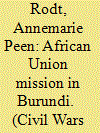

|
|
|
|
|
| Publication |
2012.
|
| Summary/Abstract |
In 2002, the African Union (AU) was established to promote peace, security and stability on the continent. Since then, it has launched military operations to help regulate conflicts in Burundi, Comoros, Sudan and Somalia. This contribution evaluates the African Mission in Burundi (AMIB). It explores the AU's nascent approach to peacekeeping and investigates the relationship between its aspiration, experience and prospect of providing 'African solutions to African problems' in the security realm. The AMIB case study suggests that both the intervener's capabilities and the conflict context in which it operates affect its success. How these two categories relate to each other also matters. Different actors affect both internal and external contextual conditions. More support from one actor can compensate for less support from another. During AMIB, South African commitments made up for limited resources on part of the AU, its member states and institutions as well as insufficient interest from international donors.
|
|
|
|
|
|
|
|
|
|
|
|
|
|
|
|
| 2 |
ID:
122576
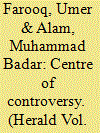

|
|
|
| 3 |
ID:
126940
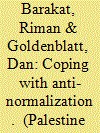

|
|
|
|
|
| Publication |
2012.
|
| Summary/Abstract |
The issue of anti-normalization has been attracting the attention of a growing number of Palestine activists. In recent months, several joint Israeli and Palestine activities have been targeted and disrupted by “anti-normalization” protesters. The issue has provoked concern among Israeli NGOs and international donors alike- the former being involved in a range of joint Israel-Palestine activities, and the latter funding those activities. The positions of Palestine NGOs are mixed. While some groups engage with Israelis in a tacit and low-profile manner, others have ended their involvement in joint activities altogether, regardless of the nature and purpose of the joint effort. Other Palestinian activists welcome joint nonviolent resistance to the occupation as in the cases of the solidarity campaigns in Sheikh Jarrah, Budrus, Ni'Lin, Bil'in, Nabi Saleh, Kufer Qadem and more. It should be also noted that there is a general exhaustion on the Palestine side, which has nothing to do with attitudes toward Israeli-Palestine dialogue and joint activity. The general sentiment among Palestine is that they should direct their energy toward developing Palestine institution and society and achieve a certain level of equality on all level before engaging with Israelis.
|
|
|
|
|
|
|
|
|
|
|
|
|
|
|
|
| 4 |
ID:
123001
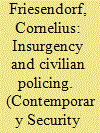

|
|
|
|
|
| Publication |
2013.
|
| Summary/Abstract |
Effective and legitimate policing is a necessary condition for the sustainable stabilization of war-torn countries. A crucial dilemma faced by international donors is whether to promote militarized or civilian policing. Particularly with insurgency and terrorism, police need robust capabilities to defend themselves and citizens against violence. At the same time, militarized police forces with weak oversight may fail to use proportionate force and serve the public. Little is known about management of this dilemma. This article argues that three established explanations - local security threats, international norms, and the political systems of donor states - do not determine the shape of police assistance programmes. Rather, the organizational cultures of donor police forces most crucially influence whether donors prioritize civilian or militarized police assistance. German support for the Afghan National Police (ANP) is a case in point. Despite deteriorating security and American pressure to support counterinsurgency, German police advisors stuck with a civilian policing model, due to their own organizational culture. Planners of foreign missions should better anticipate the organizational biases of specific donor agencies, this article concludes, to avoid frustration during the implementation phase.
|
|
|
|
|
|
|
|
|
|
|
|
|
|
|
|
| 5 |
ID:
138975
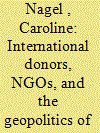

|
|
|
|
|
| Summary/Abstract |
In the aftermath of 9/11, Western states have increasingly used the promotion of democracy and civil society as a means of effecting geopolitical aims in the Middle East. Democracy promotion has involved extensive financial support of local non-governmental organisations (NGOs) who work to instill (neo)liberal-democratic values and norms among populations that are seen to be lacking in these. This article, in examining the production of citizenship as a geopolitical practice, brings critical-geography scholarship into conversation with the critical literature on Western-funded civil society in ‘transitional’ societies. We focus on the case of Lebanon, which has been targeted by Western donors due to its strategic importance in deepening regional geopolitical rivalries. We highlight the pervasiveness of Western democracy discourses in the work of local NGOs, and especially the tendency to view sectarian politics as a source of instability that must be sublimated by new forms of societal consensus. But our account also highlights the scepticism that NGO directors feel toward their own efficacy and toward the influence of Western donors in Lebanese society. Their critical assessments of Western-funded civil society call into question the extent to which democracy promotion can secure Western geopolitical interests, much less enforce Western political supremacy.
|
|
|
|
|
|
|
|
|
|
|
|
|
|
|
|
| 6 |
ID:
100125
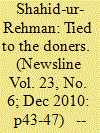

|
|
|
|
|
|
|
|